Born in 384 BC in Stagira, a small town on the northern coast of Greece, Aristotle is arguably one of the most well-known figures in the history of ancient Greece.
He was a popular pupil of famous ancient Greek philosopher Plato. But unlike Plato and Socrates, Aristotle displayed an instinct to use scientific and factual reasoning in his study of nature, a trait his predecessors routinely discarded in favor of their philosophical thoughts.
Perhaps it was because of his unyielding fascination for nature, logic, and reason that he went on to make some pivotal contributions that are still reflected in modern-day mathematics, metaphysics, physics, biology, botany, politics, medicine, and many more. He truly earns the honor of being called the First Teacher.
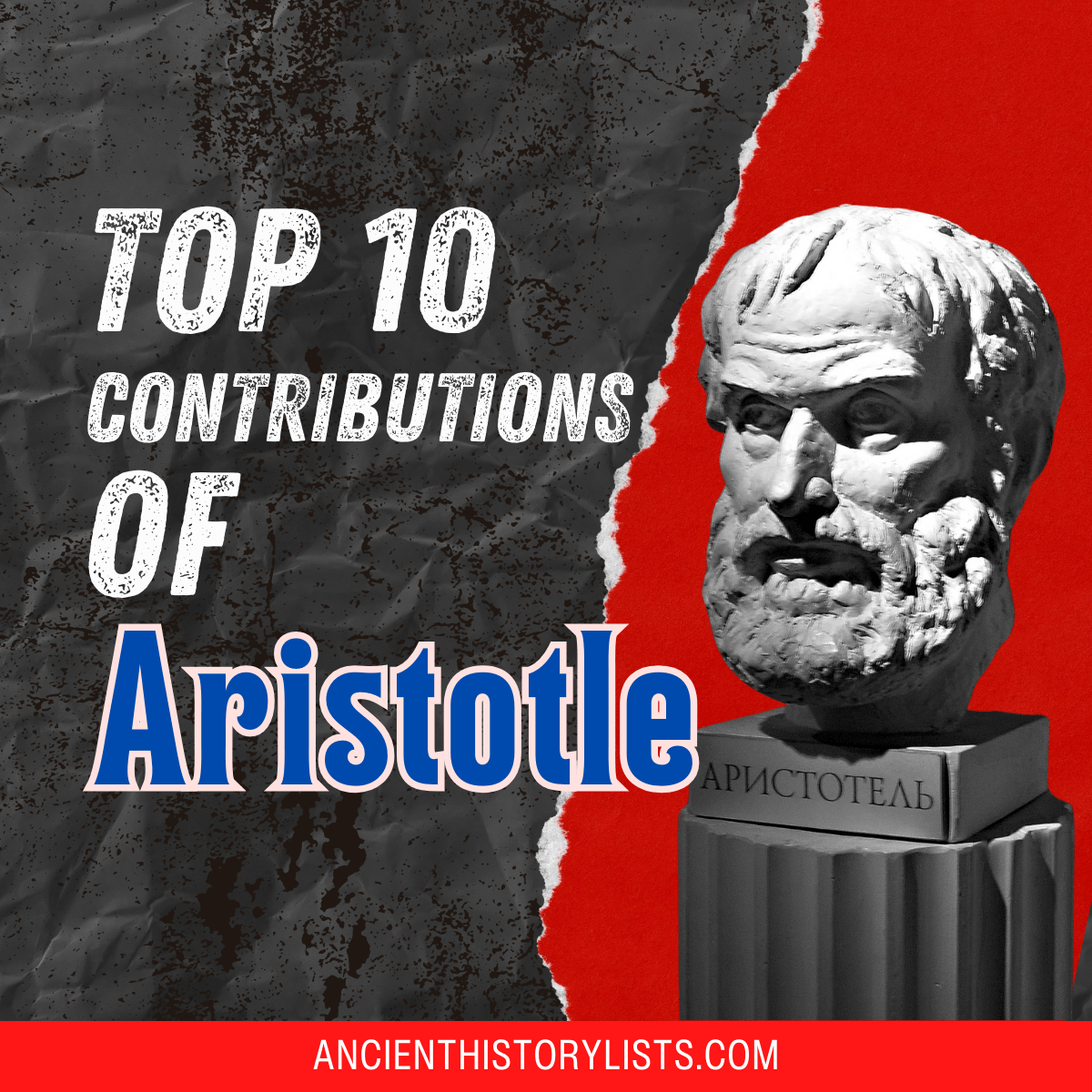
To delve further into the details of his achievements, here is a list of the top 10 contributions of Aristotle:
1. Invented the Logic of the Categorical Syllogism
Syllogism is a certain form of reasoning where a conclusion is made based on two premises. These premises always have a common or middle term to associate them, but this binding term is absent in the conclusion. This process of logical deduction was invented by Aristotle, and perhaps lies at the heart of all his famous achievements.
He was the first person to come up with an authentic and logical procedure to conclude a statement based on the propositions that were at hand. These propositions or premises were either provided as facts or simply taken as assumptions. For instance: Socrates is a man. All men are mortal. These two premises can be concluded as “Socrates is mortal.”
The logic behind finding a reasoning based on a proposition and an inference that has something common with the said proposition is pretty straightforward. Its deductive simplicity and ease of use catapulted Aristotle’s theory of syllogism to have an unparalleled influence on the history of Western logic and reasoning.
However, in the post-Renaissance era leading up to the modern age we came up with logical approaches that were based more on mathematical deductions (and were far more accurate) and less on the uncertainty of non-plausible premises. That being said, Aristotle’s logical theory of categorical syllogism attained a status that makes it far more than a mere historical curiosity.
2. Classification of Living Beings
In his book, Historia Animalium or History of Animals, Aristotle was the first person in human history to venture into the classification of different animals. He used traits that are common among certain animals to classify them into similar groups.
For example, based on the presence of blood, he created two different groups such as animals with blood and animals without blood. Similarly, based on their habitat, he classified animals as ones that live in water and ones that live on land.
In his perspective, life had a hierarchical make-up and all living beings could be grouped in this hierarchy based on their position from lowest to highest. He placed the human species highest in this hierarchy.
He also devised the binomial nomenclature. Using this system, all living organisms now could be given two different sets of names defined as the organism’s “genus” and “difference.” Aristotle meant the genus of a living being to represent its collective family/group as a whole. The difference is what makes the living organism different to other members of the family it falls within.
3. Founder of Zoology
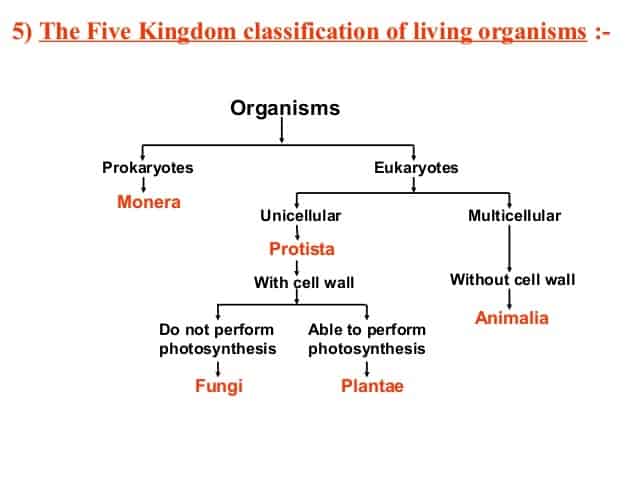
Aristotle is also known as the Father of Zoology. As evident from his classification of living beings, all his classification procedures and several other treatises primarily involved different species of the animal kingdom only. However, he wrote a number of treatises that revolved around different aspects of zoology as well. Some of his popular treatises such as History of Animals, Movement of Animals, Progression of Animals and others were based on the study of different land, water, and aerial animals.
Unlike his predecessors who merely documented their routine observations of nature, Aristotle worked on outlining specific techniques that he would use to make specific observations.
He used these empirical methods to carry out what we could call in the modern age “designation,” several proto-scientific tests and experiments to study the flora and fauna around him. One of his early observational experiments included dissecting birds’ eggs during the different stages of embryonic development inside the egg.
Using his observations, he was able to study the detailed growth of different organs as the embryo developed into a fully-hatched youngling.
4. Contributions in Physics
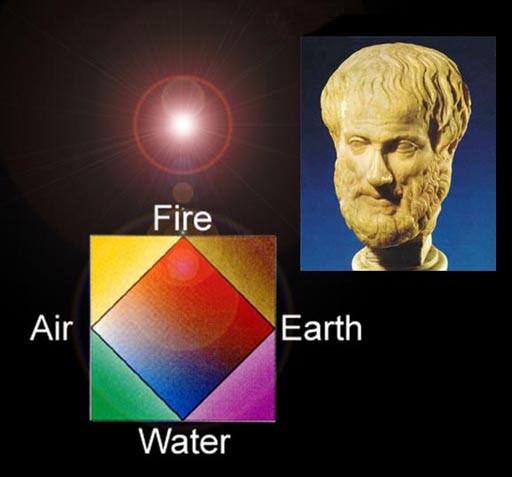
It is true that while Aristotle established new frontiers in the field of life sciences, his ventures into physics fall short by comparison. His studies in physics seem to have been highly influenced by pre-established ideas of contemporary and earlier Greek thinkers.
For instance, in his treatises On Generation and Corruption and On the Heavens, the world set-up he described had many similarities with propositions made by some pre-Socratic era theorists. He embraced Empedocles’ view on the make-up of the universe that everything was created from different compositions of the four fundamental elements: earth, water, air, and fire.
Similarly, Aristotle believed that any kind of change meant something was in motion. In a rather self-contradicting way (at least the initial interpreters found it to be so), he defined the motion of anything as the actuality of a potentiality.
In its entirety, Aristotle understood physics as a part of theoretical science that was in sync with natural philosophy. Perhaps a more synonymous term to attach to Aristotle’s interpretation would be “physis” or simply the study of nature.
5. Influences in the History of Psychology
Aristotle was the first to write a book that dealt with the specifics of psychology: De Anima or On the Soul. In this book, he proposes the idea of abstraction that reigns over the body and mind of a human being. The body and mind exist within the same being and are intertwined in such a way that the mind is one of the many basic functions of the body.
In a more detailed psychological analysis, he divides the human intellect into two essential categories: the passive intellect and the active intellect. According to Aristotle, it is in human nature to imitate something that, even if on a mere superficial level, provides us with a sense of happiness and satisfaction.
Perhaps the highlight of his psychological observations has been the delicate connection that binds human psychology with human physiology. His contributions were a giant leap forward from the pre-scientific era psychology that went before him and led us into an age of far more precise qualitative and quantitative analysis.
6. Advances in Meteorology
For his time and age, Aristotle was able to put forth a very detailed analysis of the world around him. At present, the term “meteorology” specifically encompasses the interdisciplinary scientific study of atmosphere and weather. But Aristotle had a far more generalized approach wherein he also covered the different aspects and phenomena of air, water, and earth within his treatise Meteorologica.
In this treatise, in his own words, he lays out details of “different affections” that are common between air and water, as well as the different parts of the earth, and the affections that bind those parts together. The highlights of his Meteorologica treatise are his accounts of water evaporation, earthquakes, and other common weather phenomena.
His analysis of these different meteorological occurrences is one of the earliest representations of such phenomena, although that doesn’t say much about the accuracy of his meteorological studies. Aristotle believed in the existence of “underground winds” and that the winds and earthquakes were caused by them.
Similarly, he categorized thunder, lightning, rainbows, meteors, and comets as different atmospheric phenomena.
7. Ethics
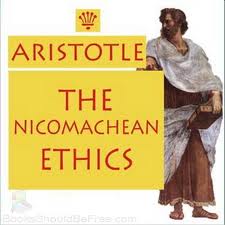
An attempt to summarize the rich details of Aristotelian ethics within the bounds of a couple of paragraphs will not do it justice. Having said that, The Nicomachean Ethics stand out as a major highlight of Aristotle’s interpretations.
It represents the best-known work on ethics by Aristotle: a collection of ten books based on notes taken from his various lectures at the Lyceum. The Nicomachean Ethics lays out Aristotle’s thoughts on various moral virtues and their respective details.
Aristotelian ethics outline the different social and behavioral virtues of an ideal man. For example, the confidence one bears in the face of fear and defeat stacks up as courage, the ability to resist the temptations of physical pleasures stand out as a person’s temperance, liberality and magnificence speak of the volumes of wealth one can give away for the welfare of others, and any ambition can never be truly magnanimous unless it attains an impeccable balance between the honor it promises and the dues it pays.
These, along with other pivotal excerpts, build the groundwork for Aristotle’s endeavors in ethics. In this ethical essence, Aristotle believed that “regardless of the various influences of our parents, society and nature, we ourselves are the sole narrators of our souls and their active states.”
8. Aristotelianism
Aristotelianism is the biggest example of the influence Aristotelian philosophy has had on the entire subsequent philosophical paradigm. Aristotelianism represents the philosophical tradition that takes its roots from the various works of Aristotle in philosophy.
The route of conventional philosophy is highly influenced by different aspects of Aristotelian ideologies including his view on philosophical methodology, epistemology, metaphysics, aesthetics, ethics, and many more.
The fact remains that Aristotle’s ideas have become deeply engrained in the social and communal thought structure of many civilizations that followed in the Western world. His philosophical works were first rehearsed and defended by members of the Peripatetic school.
The Neoplatonists followed suit soon after and made well-documented critical commentaries on his popular writings. Historians also point out major references to Aristotelianism in early Islamic philosophy where contemporary Islamic philosophers such as Al-Kindi, Al-Farabi and others translated and incorporated Aristotle’s work into their learning.
9. Politics
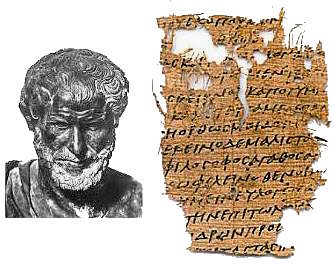
The word “politics” is derived from the Greek word polis which in ancient Greece simply represented any city state. Aristotle believed that the polis reflected the topmost strata of political association.
Being a citizen of a polis was essential for a person to lead a good-quality life. Attaining this status meant that a citizen needed to make necessary political connections to secure permanent residence. In Aristotle’s view, this very pursuit pointed to the fact that “man is a political animal.”
Without a doubt, the various ventures of Aristotle’s life helped shape his political acumen in ways his predecessors and contemporaries could not. His progressive adventures in the biology of natural flora and fauna are quite visible in the naturalism of his politics. He divides the polis and its respective constitutions into six categories, of which three he judges to be good and the remaining three bad.
In his view, the good ones are constitutional government, aristocracy, and kingship, and the bad ones include democracy, oligarchy, and tyranny. He believes that the political valuation of an individual directly depends on their contributions in making the life of their polis better.
10. Poetics

Many of the records of Aristotle’s views on art and poetry, much like many other documents of his philosophical and literary works, were composed around 330 BC. Most of these exist and survive to this day because they were duly noted down and preserved by his pupils during his lectures. Aristotle’s insight into poetics primarily revolves around drama.
During a later period when Aristotelianism was gaining more ground around the world, his original take on drama was divided into two separate segments. The first part focused on tragedy and epic, and the second part discussed the various details of comedy. According to Aristotle, a good tragedy should involve the audience and make them feel katharsis (a sense of purification through pity and fear).
Conclusion
It has been more than 2,300 years since the last day of the Aristotelian era in ancient Greece yet the research and work of Aristotle remain as influential today as it ever was. From fields that lean towards structurally scientific orientation such as physics and biology, to the very minute details about the nature of knowledge, reality, and existence, his multitudinous all-round contributions truly make him one of the most influential people in human history.
I’m glad someone wrote all of this about Aristotle but “Latin word ‘polis’”…? Come on, it’s Greek. It’s in the the word Acropolis, metropolis, politics…
Aristotle was a great scholar of ancient Macedonia. When he lived and worked in the Balkans, the Greeks had not yet arrived and Greece had not. Arvanites, Macedonians, Illyrians, etc. lived in Hellada at this time. who have spoken a language in several dialects, all of Pelasgian origin. Hellada was subsequently occupied by Philip II of Macedonia and Alexander the Great, expelling the Persian army. Upon the death of Greater Leke in 323 BC the Macedonian kingdom was ruled by the Macedonian general Casandri, who also owned Thessaly, Ellada (southern part of the Balkans). Everywhere Macedonian is spoken, close to Illyrian. With the Roman occupation during the first century BC the Balkans was named the Illyrian Province, where the Illyrian language was spoken. During this time the unnamed tribe came, since the Romans took the name “graecoi” – the Greeks, without any culture and it is not known where they came from. Until the Byzantine empire fell in 1350 this was the situation. The first Greeks made the Arvanite uprising in 1832 with King Otto. But Greece has spoken the Arvanitas language a dialect of the Albanian language. There were no ancient Greece or ancient Greeks, all made up of European chancellors and some ignorant European ideologues who did not know history. Luftulla Peza